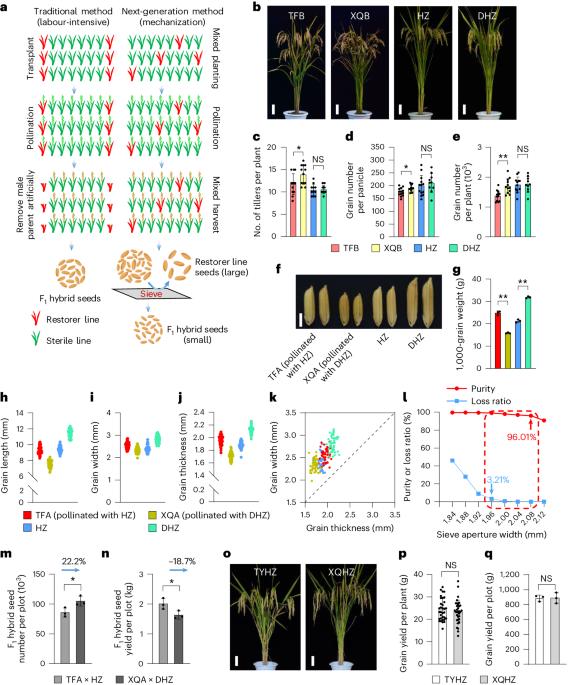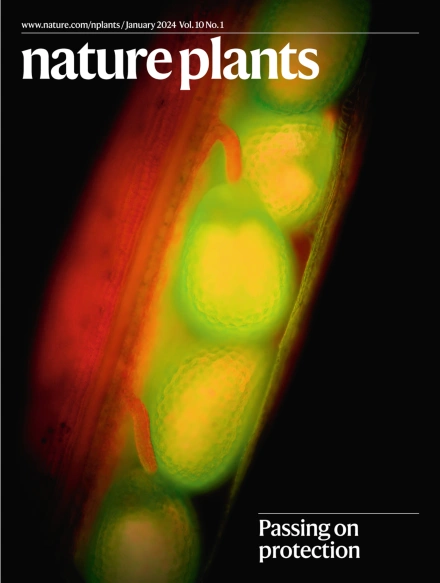Modulation of histone acetylation enables fully mechanized hybrid rice breeding
IF 15.8
1区 生物学
Q1 PLANT SCIENCES
引用次数: 0
Abstract
Hybrid rice has achieved high grain yield and greatly contributes to food security, but the manual-labour-intensive hybrid seed production process limits fully mechanized hybrid rice breeding. For next-generation hybrid seed production, the use of small-grain male sterile lines to mechanically separate small hybrid seeds from mixed harvest is promising. However, it is difficult to find ideal grain-size genes for breeding ideal small-grain male sterile lines without penalties in the number of hybrid seeds and hybrid rice yield. Here we report that the use of small-grain alleles of the ideal grain-size gene GSE3 in male sterile lines enables fully mechanized hybrid seed production and dramatically increases hybrid seed number in three-line and two-line hybrid rice systems. The GSE3 gene encodes a histone acetyltransferase that binds histones and influences histone acetylation levels. GSE3 is recruited by the transcription factor GS2 to the promoters of their co-regulated grain-size genes and influences the histone acetylation status of their co-regulated genes. Field trials demonstrate that genome editing of GSE3 can be used to immediately improve current elite male sterile lines of hybrid rice for fully mechanized hybrid rice breeding, providing a new perspective for mechanized hybrid breeding in other crops. The manual-labour-intensive hybrid seed production process is a limiting step for fully mechanized hybrid rice breeding. This work demonstrates that the use of ideal small-grain alleles of GSE3 enables fully mechanized hybrid rice breeding.


调节组蛋白乙酰化实现杂交水稻全机械化育种
杂交水稻实现了高产,极大地促进了粮食安全,但人工劳动密集型杂交种子生产过程限制了完全机械化的杂交水稻育种。在下一代杂交种子生产中,利用小粒雄性不育系机械分离混收的小粒杂交种子很有前景。然而,要在不影响杂交种子数量和杂交水稻产量的情况下培育出理想的小粒雄性不育系,很难找到理想的粒型基因。在此,我们报告了在雄性不育系中使用理想粒型基因 GSE3 的小粒等位基因可实现完全机械化的杂交种子生产,并显著增加三系和两系杂交水稻系统中的杂交种子数量。GSE3 基因编码一种组蛋白乙酰转移酶,能与组蛋白结合并影响组蛋白乙酰化水平。GSE3 被转录因子 GS2 募集到其共同调控的粒型基因的启动子上,并影响其共同调控基因的组蛋白乙酰化状态。田间试验证明,GSE3 的基因组编辑可用于立即改良当前杂交水稻的精英雄性不育系,实现杂交水稻的全机械化育种,为其他作物的机械化杂交育种提供了新的视角。
本文章由计算机程序翻译,如有差异,请以英文原文为准。
求助全文
约1分钟内获得全文
求助全文
来源期刊

Nature Plants
PLANT SCIENCES-
CiteScore
25.30
自引率
2.20%
发文量
196
期刊介绍:
Nature Plants is an online-only, monthly journal publishing the best research on plants — from their evolution, development, metabolism and environmental interactions to their societal significance.
文献相关原料
| 公司名称 | 产品信息 | 采购帮参考价格 |
|---|
 求助内容:
求助内容: 应助结果提醒方式:
应助结果提醒方式:


